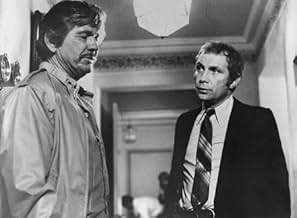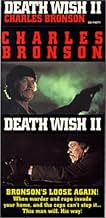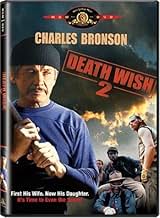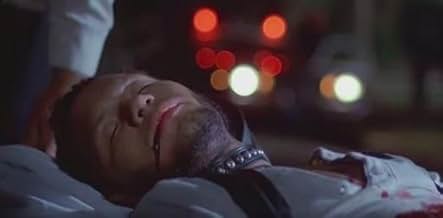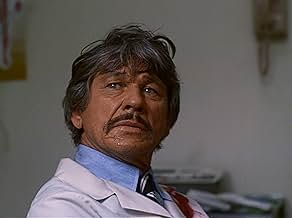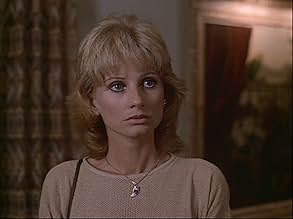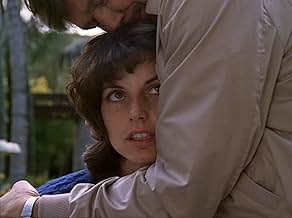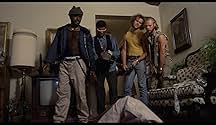IMDb RATING
6.0/10
20K
YOUR RATING
Architect Paul Kersey once again becomes a vigilante when he tries to find the five street punks who murdered his daughter and housekeeper, this time on the dark streets of Los Angeles.Architect Paul Kersey once again becomes a vigilante when he tries to find the five street punks who murdered his daughter and housekeeper, this time on the dark streets of Los Angeles.Architect Paul Kersey once again becomes a vigilante when he tries to find the five street punks who murdered his daughter and housekeeper, this time on the dark streets of Los Angeles.
- Director
- Writers
- Stars
- Awards
- 2 nominations total
Thomas F. Duffy
- Nirvana
- (as Thomas Duffy)
Laurence Fishburne
- Cutter
- (as Laurence Fishburne III)
- Director
- Writers
- All cast & crew
- Production, box office & more at IMDbPro
Featured reviews
Be grateful for Michael Winner's sledgehammer sensitivity because it produced this classic.
None of Paul Kersey's (Charles Bronson) remaining family and friends get off lightly in this twisted nightmare of domestic violence, anal rape, vigilante justice and simplistic politics.
For fans of rough justice, the rape of Bronson's Mexican housemaid is truly amazing and eroticized like crazy by Winner's leering direction.
Thomas F. Duffy as Nirvana, the film's lead thug, is really horrible and a joy to behold (in a perverse way).
Led Zeppelin's Jimmy Page provides a rock score that scorches the L.A. imagery and Vincent Gardenia returns as the cop who prefers to look the other way.
A Cannon-backed sleazefest that brings home the groceries if you like eating trash.
Screw GONE WITH THE WIND. This is much more entertaining.
None of Paul Kersey's (Charles Bronson) remaining family and friends get off lightly in this twisted nightmare of domestic violence, anal rape, vigilante justice and simplistic politics.
For fans of rough justice, the rape of Bronson's Mexican housemaid is truly amazing and eroticized like crazy by Winner's leering direction.
Thomas F. Duffy as Nirvana, the film's lead thug, is really horrible and a joy to behold (in a perverse way).
Led Zeppelin's Jimmy Page provides a rock score that scorches the L.A. imagery and Vincent Gardenia returns as the cop who prefers to look the other way.
A Cannon-backed sleazefest that brings home the groceries if you like eating trash.
Screw GONE WITH THE WIND. This is much more entertaining.
The supposed correlation between violence/sexuality in art and violence in reality has been shoved to the forefront of our culture, especially in the past decade, when incidents such as the Columbine massacre confirmed politicians' fears of an unregulated entertainment industry in need of a spanking. In non-fanatical, everyday reality, however, I have come to disagree with the equation above. Some would argue that ugly, violent, nihilistic, and generally misanthropic films like "Death Wish" and its sequels do nothing but contribute to intensifying the more unsavory impulses that lay dormant in the viewer's id.
Yet therein lies the purpose of such rough-edged, unpleasant entertainment. It sparks the id, pummels it into submission, so that when the experience is over, a sigh of relief is uttered.
The original "Death Wish" was a well-done exploitation flick with the professional gloss of an A picture; despite its relatively shallow insight into the murky moral terrain of vigilante justice, it contained an intensely subdued performance by Charles Bronson, and confident direction by Michael Winner.
By comparison, "Death Wish 2" is a typical sequel, taking what the original had and dumbing it down to milk some cash for the franchise. In addition to Bronson (in the role of architect Paul Kersey), a few other characters return to provide at least a superficial connection to the original (Robin Sherwood as his daughter; Vincent Gardenia as the cop that uncovered his identity). The plot is as before: Paul Kersey has begun a new life (courting the cheerfully cardboard Jill Ireland) which is shattered when a gang of punks (including a young Laurence Fishburne) rape and murder his housekeeper and daughter. Unlike the original, no time is spent watching Kersey contemplate his actions; he simply goes to work, and in the process is rendered a stoic killing machine. The characterization/motivation for the punks is given even less thought--they exist for the sole purpose of showing how scummy the scummiest scum of society can be. The film moves from one random encounter to the next, wherein Kersey stumbles across gang members and kills them.
Of course this doesn't sound like highbrow film-making, but "Death Wish 2" never teases the audience with any notions of greatness. In spite of the meager attention given to Kersey's character, we root for him anyway; and in spite of the inexplicably-written punks, we hope for their demise. Michael Winner once again gives the film a gritty yet polished look, though he is clearly directing a flat-out B picture; the pacing is tight (the film runs just under 90 minutes), and the action is competently choreographed (though the romantic subplot provides a respite from the relentless violence, it is shallow and cloying). Jimmy Page's offbeat musical score only adds to the unusual charge this film packs.
In the best-case scenario, "Death Wish 2" is no masterpiece, but the perfect Novocaine to apply after a particularly rotten day. It will numb you into a state of apathy and wash your troubles away (that's a compliment).
Yet therein lies the purpose of such rough-edged, unpleasant entertainment. It sparks the id, pummels it into submission, so that when the experience is over, a sigh of relief is uttered.
The original "Death Wish" was a well-done exploitation flick with the professional gloss of an A picture; despite its relatively shallow insight into the murky moral terrain of vigilante justice, it contained an intensely subdued performance by Charles Bronson, and confident direction by Michael Winner.
By comparison, "Death Wish 2" is a typical sequel, taking what the original had and dumbing it down to milk some cash for the franchise. In addition to Bronson (in the role of architect Paul Kersey), a few other characters return to provide at least a superficial connection to the original (Robin Sherwood as his daughter; Vincent Gardenia as the cop that uncovered his identity). The plot is as before: Paul Kersey has begun a new life (courting the cheerfully cardboard Jill Ireland) which is shattered when a gang of punks (including a young Laurence Fishburne) rape and murder his housekeeper and daughter. Unlike the original, no time is spent watching Kersey contemplate his actions; he simply goes to work, and in the process is rendered a stoic killing machine. The characterization/motivation for the punks is given even less thought--they exist for the sole purpose of showing how scummy the scummiest scum of society can be. The film moves from one random encounter to the next, wherein Kersey stumbles across gang members and kills them.
Of course this doesn't sound like highbrow film-making, but "Death Wish 2" never teases the audience with any notions of greatness. In spite of the meager attention given to Kersey's character, we root for him anyway; and in spite of the inexplicably-written punks, we hope for their demise. Michael Winner once again gives the film a gritty yet polished look, though he is clearly directing a flat-out B picture; the pacing is tight (the film runs just under 90 minutes), and the action is competently choreographed (though the romantic subplot provides a respite from the relentless violence, it is shallow and cloying). Jimmy Page's offbeat musical score only adds to the unusual charge this film packs.
In the best-case scenario, "Death Wish 2" is no masterpiece, but the perfect Novocaine to apply after a particularly rotten day. It will numb you into a state of apathy and wash your troubles away (that's a compliment).
It's hard to believe that anyone who didn't like the first one wouldn't like this one. Bronson is back, this time avenging the death of his daughter and he's angrier than he's ever been. This one takes more of a action hero approach than the first one, but that's okay, you see, Bronson is a bad ass and that's all that matters. Movies like this aren't made to win best picture or best screenplay, they're made to be entertaining and filled with action, and that's what this is. Bronson has a great line he give to a punk just before he blows him away; he asks the punk if he believes in Jesus as the punk clutches a cross around his neck. The punk says "yes sir" so Bronson pauses and then tells him "you're going to meet him." Then he shoots him twice, it's great. Classic. I found no insight in this film, all I found was an awesome character who you can't get enough of that gets away with killing pieces of trash that rape, mug, and murder civilians. This formula is timeless, and the whole Death Wish series should be appreciated for proving so, because I'd watch one of these films before I watch any action film that may be produced today.
Charles Bronson picks up where he left off in the famous "Death Wish" movie of 1976, going after punks and eliminating them. The only differences: he's moved from New York to Los Angeles and the violence is more graphic.
Despite the B-movie feel to this (produced by the kings of the cheapo movies of that era (70s and early 80s) : Golan/Globus, it still is very enjoyable and satisfying - if revenge is your thing. Here, Bronson revenges the death of his daughter. At least her death is quick and bloodless, unlike the unpleasant rape-and-murder scene in the first film.
Also, unlike the first film there is no need for a long setup. Bronson gets back in his vigilante mode in a hurry here and never lets up. If you want a short dose (an hour and a half) of action, this is your movie. One of the gang members in here, by the way, is a young Laurence Fishburne.
The negatives are (1) sub-par acting performances by Bronson and his real-life wife, Jill Ireland; (2) some blatant credibility problems with the story ( such as how Bronson could get across town all bloody but never be noticed;) and (3) not exactly the most intelligent dialog!
Yet, this is still an appealing movie to our conditioned satisfaction for instant revenge. So, if you've had a bad day and need a release of your hostilities, this is a good remedy!
Despite the B-movie feel to this (produced by the kings of the cheapo movies of that era (70s and early 80s) : Golan/Globus, it still is very enjoyable and satisfying - if revenge is your thing. Here, Bronson revenges the death of his daughter. At least her death is quick and bloodless, unlike the unpleasant rape-and-murder scene in the first film.
Also, unlike the first film there is no need for a long setup. Bronson gets back in his vigilante mode in a hurry here and never lets up. If you want a short dose (an hour and a half) of action, this is your movie. One of the gang members in here, by the way, is a young Laurence Fishburne.
The negatives are (1) sub-par acting performances by Bronson and his real-life wife, Jill Ireland; (2) some blatant credibility problems with the story ( such as how Bronson could get across town all bloody but never be noticed;) and (3) not exactly the most intelligent dialog!
Yet, this is still an appealing movie to our conditioned satisfaction for instant revenge. So, if you've had a bad day and need a release of your hostilities, this is a good remedy!
Lady, you scream and disturb the neighbors, we'll cut you into little pieces and eat you for dinner!
Well, we don't get the great Herbie Hancock score of the first movie, but we do get Jill Ireland, Mrs. Bronson, in one of her last films, directed as Death Wish I and III, by Michael Winner.
We also get what I feel is the biggest collection of scumbags ever assembled. Thomas F. Duffy as Nirvana, Kevyn Major Howard as Stomper, Stuart K. Robinson as Jiver, Laurence Fishburne as Cutter, and E. Lamont Johnson as Punkut. It was fitting that the first kill occurred in a rat- infested building, and the last was an electrocution.
Vincent Gardenia is back to track down Kersey after he starts again in Los Angeles.
Unlike the serious and tragic first film, this is more focused and revenge-oriented. A good film, nonetheless.
We also get what I feel is the biggest collection of scumbags ever assembled. Thomas F. Duffy as Nirvana, Kevyn Major Howard as Stomper, Stuart K. Robinson as Jiver, Laurence Fishburne as Cutter, and E. Lamont Johnson as Punkut. It was fitting that the first kill occurred in a rat- infested building, and the last was an electrocution.
Vincent Gardenia is back to track down Kersey after he starts again in Los Angeles.
Unlike the serious and tragic first film, this is more focused and revenge-oriented. A good film, nonetheless.
Did you know
- TriviaAccording to Michael Winner's biography, Charles Bronson's alcoholic brother often visited the set to borrow money. Bronson was careful not to give him too much in case someone might kill him for it. He was later found dead in a cheap hotel room having been stabbed in the buttocks.
- GoofsKay tells Kersey he will wait three minutes before ringing the security alarm, yet he only waits about a minute or less.
- Quotes
Paul Kersey: You believe in Jesus?
Stomper: Yes, I do.
Paul Kersey: Well, you're gonna meet him.
[Paul shoots Stomper dead]
- Alternate versionsThe R-rated US release is heavily edited missing part of the rape scene of the maid and most of the rape scene of Kersey's daughter (and her graphic suicide). The uncut version is available on BluRay.
- ConnectionsFeatured in Not for Women Only: Episode dated 15 February 1982 (1982)
- SoundtracksGo, Tell It on the Mountain
Traditional
Performed by the church congregation
Details
- Release date
- Country of origin
- Languages
- Also known as
- El vengador anónimo II
- Filming locations
- 1716 North Western Avenue, Los Angeles, California, USA(Pioneer Chicken where Paul Kersey stares at the punks)
- Production companies
- See more company credits at IMDbPro
Box office
- Budget
- $2,000,000 (estimated)
- Gross US & Canada
- $16,100,000
- Gross worldwide
- $16,100,000
Contribute to this page
Suggest an edit or add missing content





